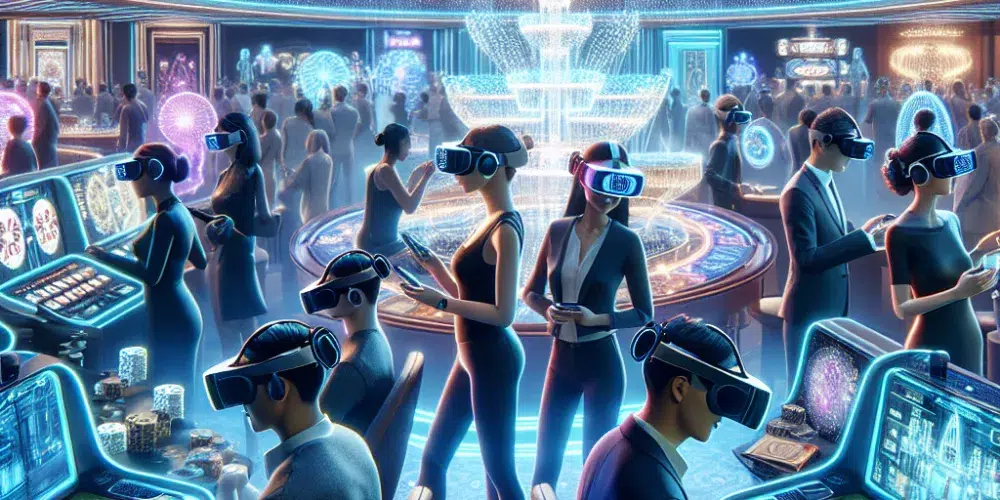In 2024, the casino industry is witnessing a groundbreaking shift as Virtual Reality (VR) technology reshapes the traditional gaming experience. This innovation is not just altering how games are played but is transforming the very fabric of casino interaction and engagement.
The Rise of Virtual Reality Casinos
The integration of VR technology into the casino sector has opened up new realms for gamers and entrepreneurs alike. Industry reports suggest that VR casinos are set to grow at an unprecedented rate, with projections indicating a multi-billion dollar increase in market size by 2025. This surge is driven by the demand for more immersive and interactive gaming experiences that traditional online platforms and physical casinos cannot offer.
Leading the charge are VR platforms that provide players with a full-spectrum casino experience, from walking through a digitally recreated casino floor to interacting with other players and live dealers in real-time. Notably, games like VR Blackjack and VR Roulette are gaining immense popularity, offering players the thrill of a Las Vegas casino without leaving their homes.
Technological Enhancements and User Experience
The success of VR casinos hinges significantly on technological advancements. Recent developments include improved VR headset resolutions and motion tracking technologies, which enhance the visual clarity and physical immersion for users. According to tech analyst Jenna Bridges, “The level of detail now achievable in VR casinos is astonishing. Players can perceive nuances like the texture of the poker chips and the smooth finish of the blackjack table.”
These enhancements are crucial in solving previous latency issues which could disrupt the gaming experience. Today’s VR casinos are equipped with faster processing speeds, ensuring actions like the spin of a roulette wheel or the shuffle of a deck are seamless and instantaneous.
Economic Impact and Regulatory Challenges
As with any burgeoning sector, VR casinos are stimulating economic interest. They’re not only creating new job opportunities in tech and gaming but also generating revenue through unique streams such as VR gambling tournaments and in-game purchases. However, this growth comes with regulatory challenges. Jurisdictions vary in their gambling laws, and adapting these to accommodate virtual reality environments is complex.
Industry expert, Mark Lester, explains, “Regulatory frameworks need to evolve to address issues unique to VR, such as ensuring the randomness of digital game outcomes and managing cross-border gambling in virtual environments.”
Player Reception and Future Trends
From a player’s perspective, VR casinos offer escapism and novelty, key drivers of player engagement. Regular casino-goer Sarah Chen shares her experience, “Playing poker in VR is thrilling; it feels like you’re truly sitting at a high-stakes table. The social element of talking and gesturing to other players adds a layer of realism that’s just captivating.”
Looking forward, the trajectory for VR casinos includes potential integrations with AI to personalize gaming experiences further and use real-time data analytics to enhance player satisfaction and retention.
Key Insights and Future Outlook
– Technological advancements in VR: Enhanced resolutions and improved motion tracking for a seamless gaming experience.
– Economic implications: New revenue streams and job opportunities balanced by the complexity of new regulatory requirements.
– Player experiences: Increased engagement driven by realism and interactive features.
FAQs
Q: What are the most popular VR casino games?
A: The most popular VR casino games currently include VR Blackjack, VR Roulette, and VR Slots, each offering unique immersive experiences.
Q: Are VR casinos safe to use?
A: Yes, reputable VR casinos utilize advanced security measures. However, players should always verify the security protocols and licensing of any VR platform.
Q: Can I interact with other players in a VR casino?
A: Absolutely, one of the hallmark features of VR casinos is the ability to communicate and interact with other players in real-time within the virtual environment.
Q: How can I access a VR casino?
A: To access a VR casino, you will need a VR headset and compatible gaming controls. Additionally, registration with a VR casino platform is required, similar to signing up for an online casino account.
Conclusion
VR casinos in 2024 are not just an innovation but a reinvention of the gaming industry’s potential. As technology progresses and more players seek comprehensive, engaging gaming experiences, VR casinos will continue to grow in popularity and sophistication, marking a new chapter in digital entertainment.

David Harrison stands tall in gambling journalism, marrying his firsthand casino experiences with a deep understanding of betting psychology. His articles transform complex gambling jargon into engaging tales of strategy and chance, making the world of betting accessible and enjoyable. David’s knack for narrative extends beyond print, making him a sought-after speaker on gambling trends and future bets. In the realm of gambling, David is both a scholar and a storyteller, captivating readers and listeners alike.


